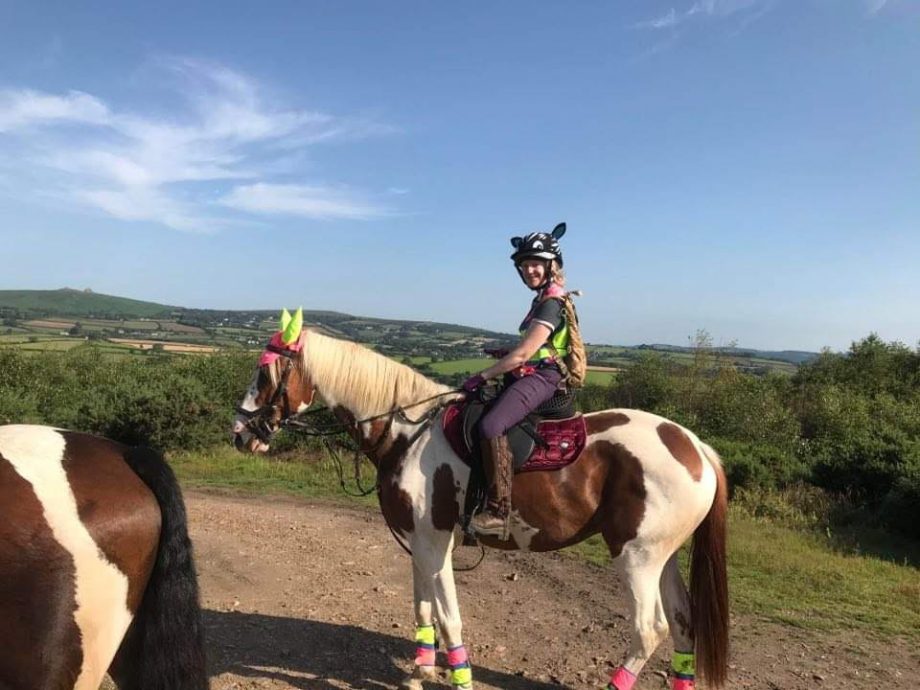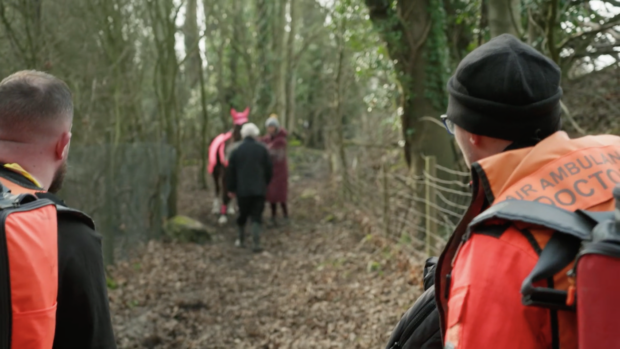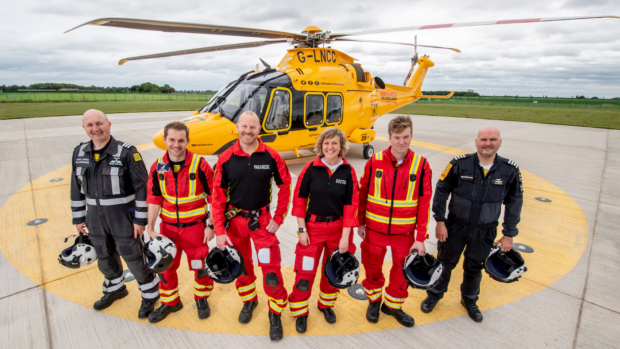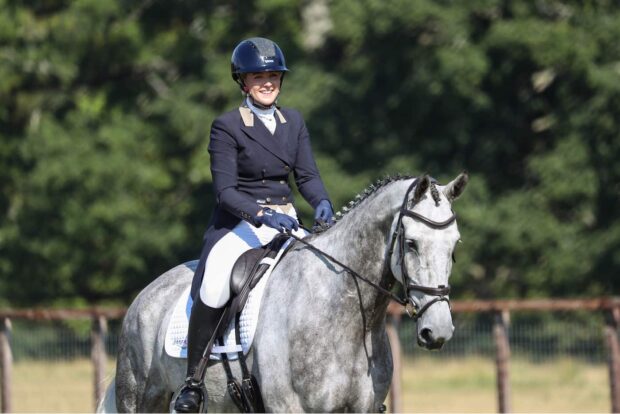Ten years on from the accident that put her in a coma, polo player Vanessa Whiteley has spoken about her experience, to help support the Thames Valley Air Ambulance crew that saved her life.
The rider, who comes from a dynasty of polo players and eventers, was 17 when her mare Kite landed on her in a freak accident during a match at Kirtlington in August 2011.
She faced several years overcoming the emotional, psychological and physical impacts of her fall — which she may not have survived without urgent intervention.
“It was the final of a weekend tournament, which was on bank holiday Monday,” Vanessa told H&H. “We’d come out of the lineout [where the ball gets thrown back into play after a goal] and we were cantering off away from everyone else, not going very fast, when Kite caught her back legs with another horse, tripped and fell down. Because we were going quite slowly I wasn’t flung out of the way, so she landed on me.”
Vanessa’s feet were still in the stirrups and her hands still around the reins, while the mare was on top of her struggling to get back up, and she was kicked several times. Her helmet also came off as she fell, and her head hit the floor.
“I don’t remember what happened at that point but one of the players on my team was an anaesthetist, and she jumped off her horse and rushed over, as did another, who had been working in intensive care at John Radcliffe [Hospital] — they both knew quite a lot about trauma and phoned an ambulance.
“The event’s paramedic also rushed over in her car. My mum asked her ‘is she dying?’ and the lady said ‘I’m not really sure’.”
Once the road ambulance arrived, the decision was made to send for an air ambulance, as Vanessa had suffered serious head and chest injuries.
On arrival, the helicopter crew established that she required an emergency chest drain, as she was “drowning in her own blood”, and needed to be taken to the John Radcliffe, in Oxford. The procedure was performed and Vanessa was transferred to intensive care, where she had to be intubated and put into an induced coma.
Vanessa recalled that when she briefly regained consciousness on the first day, before being put back under, the first thing she did was talk about her horse.
“I said I couldn’t hold Kite and that I felt her falling but couldn’t do anything about it — then within a couple of hours I was unconscious again,” she said.
“Horses do so much for us, it was an awful thing to happen [but] I knew she would really have tried her hardest not to fall down,” she said.
Vanessa was in intensive care for a total of nine days, and was able to return home after 10.
“I remember very well when they had to take the intubation tube out,” she said. “You have to cough and it was extremely painful to cough because of my broken ribs. It felt like the bristle-side of a hairbrush coming out and they told me I needed to cough harder and I didn’t think I could do it, it was very claustrophobic.”
She also recalled her first walk around the ward on day seven.
“I was a 17-year-old with a zimmer frame, in a gown with a bare bottom and DVT socks!” she said. “I’d gone from being a fit and healthy 17-year-old a week earlier to barely wanting to sit up.”
Vanessa faced several battles in her recovery but had not initially lost her nerve when it came to riding — although it became clear her balance was an issue.
“I wore a body protector for a whole year riding and hunting after my fall, as I kept getting unseated. I basically never fell off before the accident, so the shock of coming off so often, as well as having had a terrible accident that was maybe my fault, started to make me think that maybe riding horses shouldn’t be my hobby,” she said.
She benefited from having experienced support around her — her father, Puff Whiteley, has played polo since his Pony Club days (her grandfather, Timothy Whiteley, also played and hunted), while her paternal grandmother Jane Whiteley (formerly Drummond-Hay, sister to Anneli) was second at Badminton and has multiple dressage accolades.
“I didn’t really make a conscious decision to keep riding, I just kept getting on. My dad kept saying ‘do you want to go riding?’ and I kept saying ‘yes’.” she said.
Vanessa’s bigger battle in her recovery was with the impact the accident had on her, at such a formative stage of her life.
“I had this awful depression but I didn’t know it at the time, I found it really hard getting up in the morning,” she said. “As a teenager you’re expected to have a lot of energy and a smile on your face and engage in extra activities and I had an awful few years, when I’d just keep cancelling on people — it took me a while to get out of that zone.
“I found it difficult to get out of the house and put clothes and make-up on and present myself to strangers, I just wanted to stay inside with the dogs. Then a year after the accident I was telling people about it very early on when we met, I would thread it into any conversation. People do say it’s toxic to let a terrible trauma define you. A lot of the insecurities I already had surfaced and had an extra impact and I had an excuse that I was using as a crutch — I would almost say ‘I can’t see you tonight because I had an accident a few years ago’.”
Vanessa’s accident happened between her first and second year of A-levels but she continued on to university, initially studying French and Spanish at Oxford Brooks, and going on to study psychology and Spanish at Buckingham.
She played her first polo match at Rugby a year after her fall — which she describes as a “momentous day” — and organised her first fundraising day for Thames Valley Air Ambulance at Kirklington Polo Club in 2013.
“I’ve been involved with the air ambulance ever since,” she said. “My mum arranged for me to visit the crew that airlifted me six weeks after I came out of hospital and I have done a lot of fundraisers since.”
She also spent some time after she graduated working in logistics at Kidlington, where the air ambulance is stationed, ordering parts for helicopters.
“I had a wonderful year working there and it’s where I met my now fiance,” said Vanessa, who also recently started a new job as a teacher. “It was wonderful being part of the team that put the air ambulances back in the sky. It was really meaningful for me.”
Vanessa is the face of the year’s Thames Valley Air Ambulance summer raffle, which is raising funds to keep the service going. Air ambulances have no state funding and run entirely on donations.
They are a life-saving service for riders and Thames Valley’s crews have delivered critical care to 99 equestrians since 2018.
Horse-related incidents can lead to life-changing injuries requiring urgent intervention — and for these injured riders, the pain relief and procedures that Thames Valley Air Ambulance crews offer over and above a regular ambulance can make all the difference.
Summer is a peak time for accidents, with a quarter of all equestrian incidents happening between May and June.
Thames Valley Air Ambulance senior critical care paramedic Richard Company said: “Equestrian emergencies can mean extra hurdles for our crews to overcome. With the sheer weight of the horse and the fact that riders are often travelling at speed, we are likely to encounter severe injuries and shock. For incidents where spectators have witnessed the event, it can be very traumatic for bystanders too.
“The advanced drugs and kit that our expert crews carry mean we give patients the best possible chance of survival and recovery. Whether it is sedation, pain relief or performing an intervention then and there – we bring the hospital to the horse rider.”
To support Thames Valley Air Ambulance’s summer raffle, visit the service’s website.

Para rider survives dislocated knee, lost sight and broken skin to complete epic 51-mile trek

‘I was in agony’: Rider who broke back raises funds for air ambulance
‘I’m so grateful to the air ambulance – I don’t know what we would have done without them’

Subscribe to Horse & Hound magazine today – and enjoy unlimited website access all year round
Horse & Hound magazine, out every Thursday, is packed with all the latest news and reports, as well as interviews, specials, nostalgia, vet and training advice. Find how you can enjoy the magazine delivered to your door every week, plus options to upgrade your subscription to access our online service that brings you breaking news and reports as well as other benefits.




